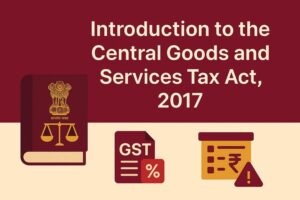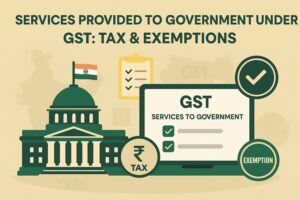Health Insurance GST Rate & HSN Code India
- 5 Nov 25
- 8 mins
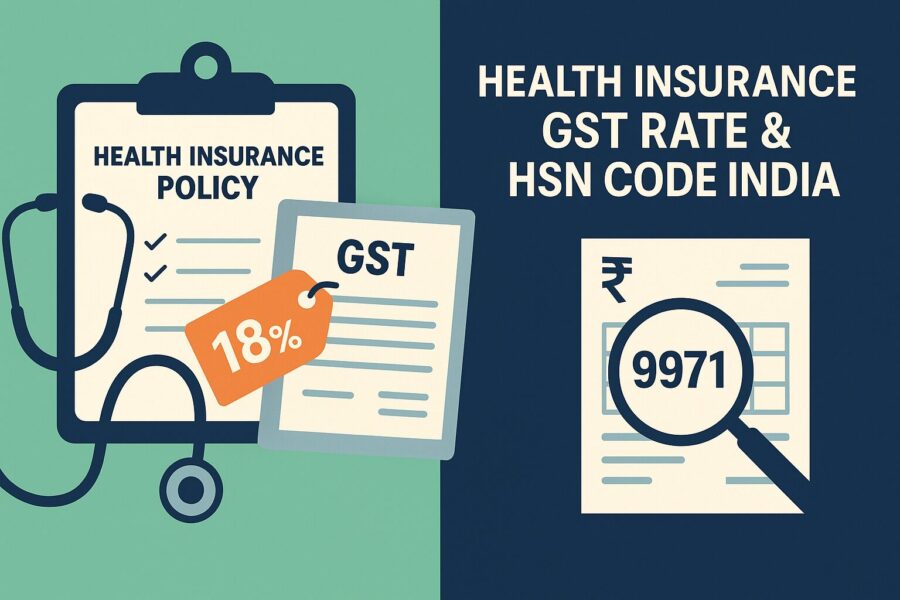
Health Insurance GST Rate & HSN Code India
Key Takeaways
- Health insurance GST rate is 18% on all policy premiums under HSN code 997133.
- Government health schemes like Niramaya and Universal Health Insurance are exempt from GST.
- No ITC is available on health insurance, unless it’s mandatory under labour laws.
- Section 80D allows tax deductions on health insurance premiums, including the GST portion.
- The GST Council may lower the GST rate on health insurance from 18% to 5% in future revisions.
The health insurance GST rate in India is 18%, which influences the overall premium being paid by the policyholder. While obtaining health insurance is a wise choice, understanding the Goods and Services Tax implications is crucial.
Additionally, for proper tax compliance and avoiding penalties, you will need to know the HSN codes apart from the GST rate on medical insurance. Continue reading to learn about the impact of the indirect taxes of India on your health insurance and how you must prepare before you purchase a policy.
What is the Health Insurance GST Rate and HSN Code Under GST?
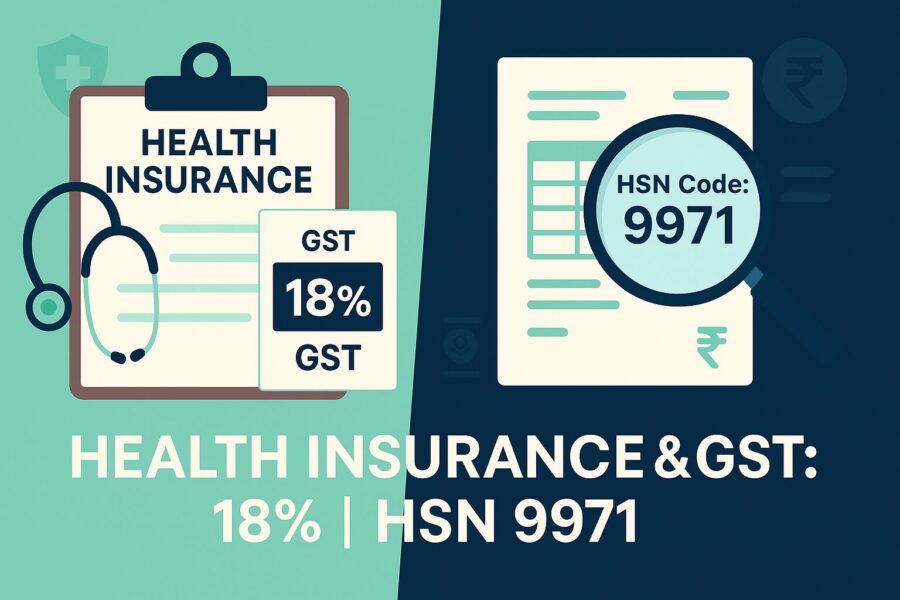
Knowing the relevant health insurance GST rate is crucial to controlling insurance expenses and reducing tax burden. The following table presents the GST rates and HSN codes for various health insurance services in India:
| Description of Service | GST Rate | HSN Code |
| Niramaya Health Insurance Scheme (run by the Cerebral Palsy, Mental Retardation and Multiple Disabilities Act, 1999, Trust under the National Trust for the Welfare of Persons with Autism) | Nil | Heading 9971 or Heading 9991 |
| Universal Health Insurance Scheme | Nil | Heading 9971 or Heading 9991 |
| Accident and preventive health care services of all kinds | 18% | 997133 |
What is the GST on Health Insurance?
The health insurance GST rate in India is imposed at a rate of 18%, payable on health insurance premiums on purchase or renewal. This is under the HSN code 997133 and will apply to all medical insurance plans, such as individual, family, floater, and critical illness policies. There are exemptions from GST to certain government-sponsored schemes for the economically weaker sections.
Schemes like the Universal Health Insurance Scheme and the Nirmaya Health Insurance Scheme have a nil GST rate. Therefore, knowing these GST regulations helps policyholders make informed decisions while providing cheap coverage to vulnerable income groups for better public healthcare.
What are the Types of GST on Health Insurance?
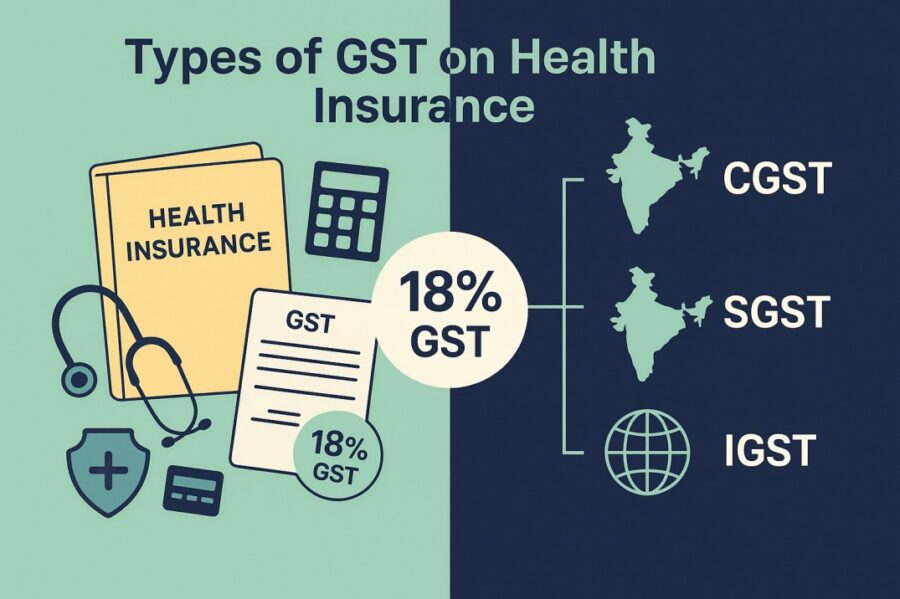
Health insurance policyholders must be well-informed about the health insurance GST percentage to understand the costs and benefits arising from it. Here are the different types of GST which apply to health insurance premiums in India:
GST on Premium
The most common type of GST used in health insurance is 18% which is charged on the premium payment. This tax is imposed at the time when the policy is purchased or renewed, which increases the total policy cost of the insured person.
Input Tax Credit (ITC)
Health insurance providers can claim ITC on services including legal fees, accounting expenses, and other operating expenses. This credit takes off their net GST liability and may assist them in remaining competitive in the Indian insurance industry.
GST on Different Services
Other healthcare services, such as doctor consultation, hospital room rent and alternative treatment services not covered in the insurance plan you have, also include GST. The amount of taxes paid relies on the type of service and how it is subject to GST regulations.
GST on Claims
When you make a medical claim, it is not charged to GST. However, the insurer may charge GST if the policy does not cover the services and the insurer pays for them directly.
Conditions and Special Provisions
The schemes of some insurance companies, which are centrally funded, may have an exemption from GST. However, it depends on the specific terms and conditions of the policy.
How to Calculate GST for Health Insurance?
GST on insurance premiums is determined by the total amount of premium to be paid on the policy. Let us consider an example to see the impact of the health insurance GST rate:
Suppose you buy a health insurance policy that provides coverage of ₹7,00,000. The policy has an annual premium of ₹14,000.
Before GST Implementation
Previously, a service tax of 15% was levied. Hence, the total health insurance premium would have been:
15% of ₹14,000 = ₹2,100
Total payable: ₹14,000 + ₹2,100 = ₹16,100
After GST Implementation
Under the current GST regime, an 18% tax is applicable. The calculation is as follows:
18% of ₹14,000 = ₹2,520
Total payable: ₹14,000 + ₹2,520 = ₹16,520
This example demonstrates that the premium cost has increased with GST since there is direct tax compliance for policyholders. They are paying ₹420 more per year than before GST. Hence, industry experts claim that knowing how GST calculation is done assists in proper budgeting of the cost of health insurance.
Can Businesses Claim GST on Health Insurance?
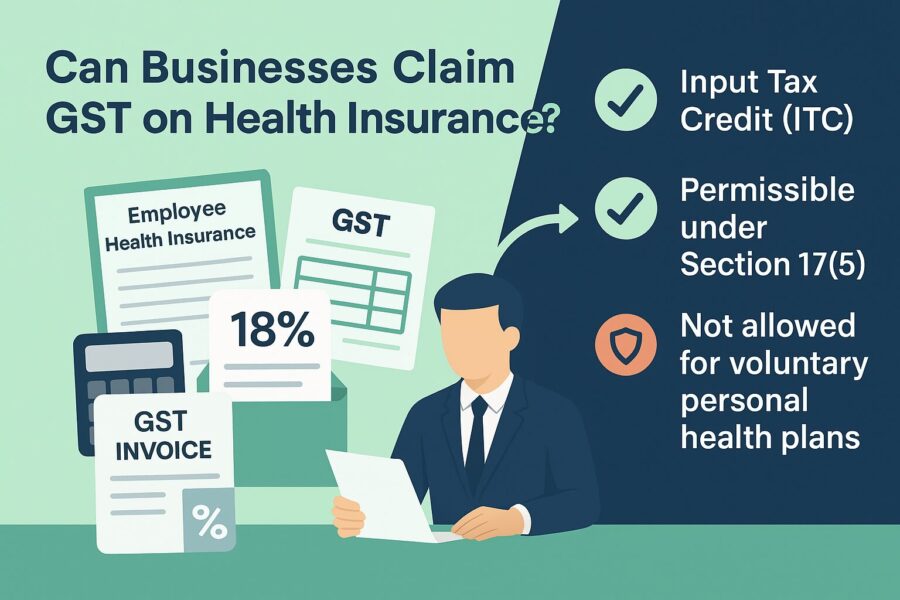
In general, businesses cannot claim input tax credit under Section 17(5)(b) of the CGST Act paid on health insurance premiums. However, there is an exception in case it is legally required under any of the labour laws in India. Businesses can claim GST on health insurance policies for their staff under Central GST, State GST, and Union Territory GST.
Conversely, under the Income Tax Act, the GST rate on health insurance policy charged on premiums is subject to a tax deduction under Section 80D. This tax benefit enables individuals to claim a tax deduction of the entire amount paid for medical insurance premiums, including the GST portion.
Any exemption on premiums paid for medical insurance is not included in Section 80C or Section 80CCC. Therefore, although GST on medical insurance is not always available for ITC, it can still provide tax benefits under income tax laws.
55th GST Council Meeting on Health Insurance GST
The 55th meeting of the GST Council in December 2024 proposed to lower the health insurance GST rate imposed on premiums, which was included in Budget 2025. However, the proposal was deferred. Instead, the Council voted to send the issue to a Group of Ministers (GoM) to further examine it and draft an elaborate report on it.
Based on the meeting outcomes, the following
- Mediclaim GST rate exemption for individuals other than senior citizens with a cover of up to Rs 5 lakh.
- Exclusion of GST on term life insurance policy premiums and health insurance policy premiums for senior citizens.
- Decreasing the GST rate on health insurance policies paid by non-senior citizens from 18% to 5%.
The government introduced these proposals to enhance affordability and encourage increased insurance purchases. However, the GST Council felt the need for more discussions to implement the suggestions, so they deferred them.
Conclusion
Financial protection is an important aspect of mediclaim policy, but it also requires an understanding of the associated costs. Currently, the health insurance GST rate stands at 18% in India.
Being knowledgeable about GST exemptions, HSN codes, and any policy changes can help you make better financial decisions. With discussions about a potential reduction in GST ongoing, staying informed could lead to future savings.
💡If you want to streamline your payment and make GST payments via credit, debit card or UPI, consider using the PICE App. Explore the PICE App today and take your business to new heights.
 By
By 





